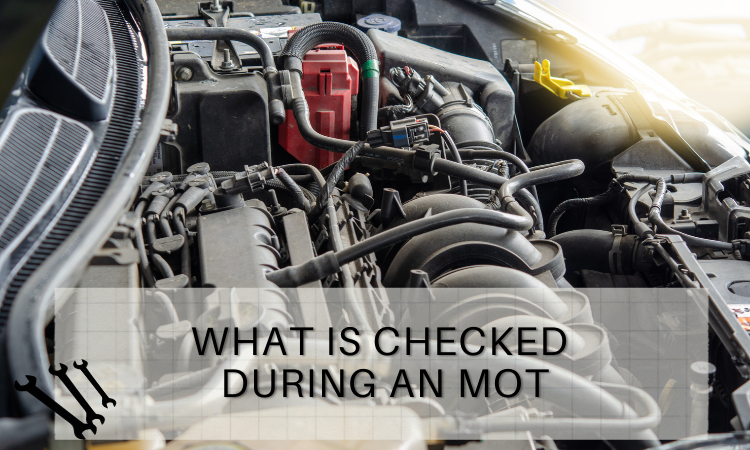What is checked during an MOT
An MOT (Ministry of Transport) test is an annual assessment of a vehicle's safety, roadworthiness, and environmental standards. It is a legal requirement for any vehicle over three years old in the UK, and it must be conducted by an authorised MOT testing centre. The MOT test covers a wide range of checks to ensure that your vehicle is safe to be driven on public roads.
Here are some of the key components that are checked during an MOT:
- Vehicle Identification Number (VIN) - the VIN is checked to ensure that the vehicle is correctly registered and matches the documentation.
- Lights - all lights, including headlights, brake lights, indicators, fog lights, and hazard lights, are checked to ensure they are functioning correctly.
- Tyres and wheels - tyres are checked for tread depth, wear, and damage, and wheels are checked for damage and security.
- Brakes - brake performance is tested to ensure that they are functioning correctly and effectively.
- Suspension and steering - suspension and steering components are checked for wear, corrosion, and damage.
- Seat belts - all seat belts are checked for damage and functionality.
- Exhaust emissions - the vehicle's emissions are checked to ensure that they meet the required standards.
- Bodywork - the bodywork of the vehicle is checked for corrosion, damage, and security.
- Windscreen and mirrors - the windscreen is checked for damage, and mirrors are checked for security and visibility.
- Horn - the horn is checked to ensure that it is functioning correctly.
As a vehicle owner in the UK, an MOT test is a mandatory requirement to ensure that your vehicle meets the minimum safety and environmental standards. The MOT test is carried out annually, and it involves a series of checks that are performed on your vehicle. In this article, we will discuss everything that is included in an MOT and the checks that are performed.
What is an MOT Test?
An MOT test is a legal requirement for all vehicles that are more than three years old. The purpose of an MOT test is to ensure that your vehicle meets the minimum safety and environmental standards set by the government. An MOT test is conducted by an approved testing centre, and it checks the roadworthiness of your vehicle.
What Checks Are Performed During an MOT?
During an MOT test, several checks are performed on your vehicle to ensure that it meets the minimum safety and environmental standards. Here are some of the checks that are carried out during an MOT test:
Lights and Indicators
During an MOT test, the lights and indicators of your vehicle are checked to ensure that they are in good working condition. The headlights, taillights, brake lights, and indicators are tested to ensure that they are functioning correctly.
Suspension and steering
The suspension and steering systems will be examined to ensure they are in good condition and working properly. The mechanic will check for worn or damaged components, leaks, and excessive movement.
Brakes
The brakes are one of the most important safety features of any vehicle, so they will be thoroughly inspected during an MOT. The mechanic will check the brake pads, discs, shoes, and drums for wear and damage, and will also examine the brake fluid and brake pipes.
Tyres and wheels
The mechanic will check the condition and tread depth of all four tyres, as well as the wheel alignment and balance. They will also look for any damage to the wheels or rims.
Exhaust and emissions
The exhaust system will be checked for leaks, damage, and excessive noise, while the emissions will be tested to ensure they meet the required standards for your vehicle's age and type.
Seatbelts and seats
The mechanic will examine the condition and operation of all seatbelts, including the anchorages and buckles. They will also check the seats for damage and security.
Bodywork and doors
The bodywork and doors will be inspected for any damage or corrosion that could affect the safety or roadworthiness of the vehicle.
Windscreen and wipers
The windscreen will be checked for damage, and the wipers will be tested to ensure they are working properly.
Other checks
In addition to the above, the mechanic will also examine other areas such as the horn, registration plates, and fuel system.
What happens if my vehicle fails its MOT?
If your vehicle fails its MOT, you will be given a list of the defects and advised on what needs to be fixed. You will then have a certain period of time to carry out the necessary repairs and have the vehicle retested. If the defects are not fixed within the specified time frame, you will be unable to legally drive the vehicle on the road.
FAQs
How much does an MOT cost?
The maximum fee for an MOT is currently set at £54.85 for cars and motor caravans.
How long does an MOT take?
An MOT usually takes around 45 minutes to 1 hour, although this can vary depending on the vehicle and any issues that are found.
An MOT test is a comprehensive assessment of a vehicle's safety and roadworthiness. The test covers a range of checks, including lights, tyres, brakes, suspension, steering, seat belts, emissions, bodywork, windscreen, mirrors, and horn. It is essential to keep your vehicle in good condition to pass the MOT test and ensure that it is safe to be driven on public roads.



